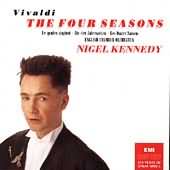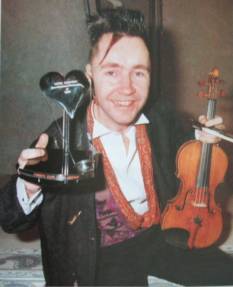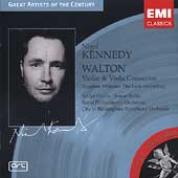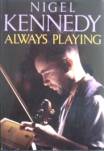|
Nigel Kennedyand the violaNigel Kennedy is a very famous violin player, I mean really world famous, not only to the typical classical music buff but to a much broader audience. He became famous like maybe a rock star when in 1990 his recording of Vivaldi’s Four Seasons sold 1,000,000 copies, something unheard of for a classical music CD, with masterpieces selling around 10,000 copies a year. 
His eccentric behaviour, with unconventional concert dressing and haircut have contributed to make him popular among a new type of audience, on one hand and, on the other hand, to make many in the classical music field frown upon him. I personally agree that classical music should reach a wider and different type of audience, because it is too beautiful to be confined in this sort of specialised listeners’ ghetto, so I look with a favourable eye to anything that promotes classical music.
Nigel Kennedy wrote an interesting autobiographic book, Always playing which reveals hidden, unexpected aspects of his childhood and personality. It is now out of print, but you can find a used copy by clicking on the title. I personally like his fresh attitude, his view of music, the freedom to enjoy making music and show this enjoyment, that he found in jazz playing and then put into his classical music performances, compared to the more rigid and serious classical music playing, his desire to reach a wider audience, his dislike for formalities such as not being allowed to play an encore if the audience asks for it, because it ‘something not to be done’. I like his expression “We may play dead composers’ works, but we don’t have to look as if we’re still as the funeral”, it summarises his attitude. Nigel Kennedy was born in 1956 in Brighton, England, learnt
to play piano with his mum, then violin and at seven entered the Yehudi Menuhin Music School in London. In his book he wrote he recalls with gratitude the financial help received from Menuhin for his studies there. Later he studied at the Juilliard School in New York and at the same time started playing jazz night time in clubs, where he played with another famous violin performer such as Stephane Grappelli, and missing the next morning lesson, ‘stretching the rules’ as far as he could, as he tells.

His teacher there didn’t approve of him playing jazz but he kept doing it and says it helped him a lot in his musical development. Then he went back to England starting his career as a violinist, trying to do it ‘his way’, wishing to be accepted as he was, despite or thanks to his eccentricities, not much conformed to all the serious rules of classical music (in his book he makes a list of all the ones he can’t stand). Actually, he made it! As you can see in this photo, in 1990 he even won the Variety Club Show-Business Personality of the Year Award, for the first time given to classical music.
Nigel Kennedy, the viola playerYes, even Nigel Kennedy felt this fascination that many virtuoso violin performers (and not only virtuosos) feel for the viola and recorded a viola concerto, one of the most famous viola compositions, that is William Walton’s viola concerto 
Walton wrote this concerto having Lionel Tertis in his mind, although Tertis didn’t premiere nor ever performed it because, he admitted, he couldn't understand it at that time. Some have criticised Kennedy’s recording, saying that it can’t match ‘real’ viola players’ tone. It may be true, but I want to see the good side of it, that it may have contributed to make Walton’s concerto better known. So if you like Kennedy you may want to listen to a bit of its three movements, Andante Comodo, Vivo, Con Molto Preciso, Allegro Moderato. Click below and enjoy this great composition.
Read about Walton Viola concerto Another curiosity in some way connected with the viola is that Nigel Kennedy’s granddad, Lauri Kennedy, played cello and recorded Kreisler’s quartet with Kreisler himself and the great viola player William Primrose. Go back from Nigel Kennedy to Famous violin players
|
Find what you are looking for,
use this search box




